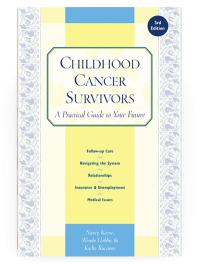In addition to the emotional reactions already discussed, many survivors and their families experience feelings of anger in the years after treatment ends. It is not unusual for survivors or family members to feel robbed of a “normal” life when they experience reminders of the costs of cancer and treatment. Adolescents just understanding the ramifications of their physical differences, for example, might feel anger that waxes and wanes over several months as they deal with questions like: “Why did this happen to me?” “When will I just be a normal kid?” “What do you mean this won’t ever really be over with?” Parents, too, might feel bursts of anger as they watch their children continue to struggle with late effects of treatment. One father disclosed, for example, that even 20 years after his daughter’s successful treatment for a brain tumor, he has weeks when he is incredibly angry that the possibility of independent living has been stolen from her, and that he must continue to worry about who will provide for his child when he is no longer able to do so.
My wife got sad, but I got very angry and have stayed that way in the years since my son was diagnosed. I feel like the disease stole his childhood and stole part of my life as a parent. It took away some of his abilities and wrecked his friendships. The disease is rotten, the treatment is rotten, and I get furious just thinking about it.
It is important to keep in mind that feeling angry is a normal, healthy reaction to the losses caused by cancer. You are most likely to feel bursts of anger at times when life changes or developmental demands remind you of the things you have lost to cancer. This might mean that you are angry a year after cancer, or even 20 years after cancer. These feelings might occur with other feelings or might occur by themselves. You might find that your anger, or that of your child, parent, sibling, or partner, is expressed through behavior such as tantrums or angry, destructive actions.
When these angry periods come up, it is best to recognize them for what they are—normal reactions to an unusual life situation—and to express that anger as best you can to those with whom you are close. If that is not possible, or if angry feelings or behaviors get in the way of doing what you want to do in your life or affect your relationships, seek support from a mental health professional, support group, nurse, nurse practitioner, or physician. Survivors and their family members have reported that once they feel supported in putting cancer and its inevitable effects in their place, they are able to more comfortably manage the anger without letting it derail them.
I was amply informed about anger as a normal emotion I might experience, but it really didn’t surface for me until about 3 years after the end of treatment for Hodgkin’s. Then it came out fighting and grew. I was mainly angry about how many friends I began losing to cancer, especially a so-called good kind like Hodgkin’s. But as time passed, I became very angry about the ways in which cancer has influenced my life choices. I can’t simply take a semester or year off to travel or do whatever like many of my colleagues have—there’s the insurance coverage to consider. It makes me really angry when others try to tell me how I should feel, reminding me how much others have achieved after cancer and how grateful I should be just to be alive. Give me a break!
One thing that does help with the anger is channeling it into a constructive form. For example, anger over the deaths of my friends and over my own experiences led me to write an application piece to be a delegate from my state to The March in September 1998. I was indeed chosen, and even asked to speak before our representatives’ and senators’ assistants. It was an incredibly emotional experience, but one of the best I’ve ever had. Some of the audience members began crying as I spoke. It was a wonderfully fulfilling experience that grew out of my own anger and frustration.
Table of Contents
All Guides- 1. Survivorship
- 2. Emotions
- 3. Relationships
- 4. Navigating the System
- 5. Staying Healthy
- 6. Diseases
- 7. Fatigue
- 8. Brain and Nerves
- 9. Hormone-Producing Glands
- 10. Eyes and Ears
- 11. Head and Neck
- 12. Heart and Blood Vessels
- 13. Lungs
- 14. Kidneys, Bladder, and Genitals
- 15. Liver, Stomach, and Intestines
- 16. Immune System
- 17. Muscles and Bones
- 18. Skin, Breasts, and Hair
- 19. Second Cancers
- 20. Homage
- Appendix A. Survivor Sketches
- Appendix B. Resources
- Appendix C. References
- Appendix D. About the Authors
- Appendix E. Childhood Cancer Guides (TM)

